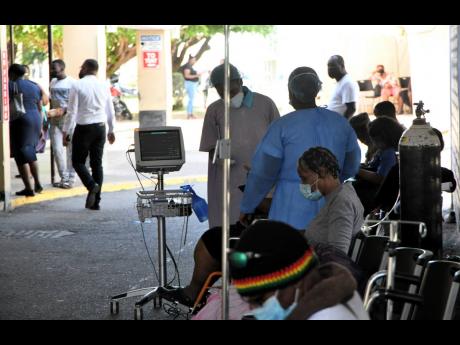Emergency cases only
Gov’t rings alarm on COVID hospital overload
Yielding to pressure from doctors and nurses, the Holness administration has ordered all public hospitals to treat only emergency cases in a bid to manage a crippling coronavirus outbreak that has flooded wards and caused infected healthcare staff to be pulled from the front line.
“We are being affected by the infection rate among healthcare staff, particularly our nurses and doctors. This is affecting our service response in all areas. When this happens, we have to prioritise for emergency cases,” Health and Wellness Minister Dr Christopher Tufton told The Gleaner Monday night.
“We also have to be sensitive to the strain on our staff who are able to work but have to carry heavier responsibilities due to their colleagues who are out sick. It’s a stressful time for those ill and those at work,” Tufton added.
The quarantine crisis has stretched the manpower of public hospitals, with healthcare workers wilting under the stress and refusing even financial inducement in the fourth wave of the pandemic.
Record rates of infection have caused a grim reprisal of the outbreak that put healthcare facilities on the brink of collapse last summer during COVID-19’s deadliest hour.
This iteration of the outbreak has not been haunted by the fatality rate that saw more than 400 people dying from complications from the virus in August, but the sheer numbers – and lightning contagiousness of the Omicron variant – threaten to compromise standards of service.
Worsening staff-to-patient ratios have put pressure on the May Pen Hospital in the central Jamaica parish of Clarendon, with Senior Medical Officer (SMO) Dr Bradley Edwards acknowledging “challenges with being able to look after everybody in a timely manner”.
Sixty-four healthcare workers, or 12 per cent of a total complement of 540, are currently in quarantine or isolation at home, the hospital’s SMO said.
“The staff are getting burnt out. They don’t even want to do overtime anymore because it’s just too much stress on them,” Edwards told The Gleaner on Monday.
Edwards indicated that while overall hospitalisations there remain low, there has been an increase in both COVID-19 patients and others turning up with other non-communicable, or lifestyle-related, illnesses.
The SMO said that besides increasing numbers of COVID-infected persons reporting to the Accident and Emergency Department, January typically sees a surge in patients struggling with complications from diabetes, hypertension, and other lifestyle diseases after the Christmas holidays.
But the main problem besetting May Pen is the wave of infections or exposure that has displaced its staff, despite the majority of them being vaccinated.
He has described the state of affairs as “devastation”.
“We’ve had to be calling back people off leave. But as soon as we can get back to a state of normalcy, then we can get people to go off again,” he said.
The University Hospital of the West Indies (UHWI) in St Andrew is suffering a similar woe, with approximately 190, or six per cent, of its close to 3,000 staff members in quarantine or isolation, even amid high vaccination take-up.
UHWI Public Relations Manager Nordia Francis-Williams said in a Gleaner interview on Monday that staff shortages have increased the burden on remaining employees who have been forced to work longer hours.
“We are still counting because occupational health keeps getting risk assessments with staff members who have contracted the virus. And as a medical institution, this is concerning because to have so many medical staff out, it puts strain on the other persons who are working,” said Francis-Williams, urging Jamaicans to get vaccinated.
Jamaica’s vaccination campaign has virtually stalled, with 21 per cent of the population fully inoculated and take-up plunging even with hundreds of thousands of doses available.
COVID-19 vaccines do not prevent the transmission, but scientific studies and public-health data show that the risks of severe illness or death are significantly reduced.
Edwards also stated that despite turnover cases among vaccinated workers, inoculation against COVID-19 remains a key strategy in curtailing hospitalisation rates.
“If you do get COVID and you are vaccinated, you recover faster, and that is what we are seeing. Within three days, the majority of our staff are able to come back to work,” Edwards said.
“Some might need a little more time, but the majority of our staff have been able to come back to work.”
Occupancy levels are under pressure nationwide, but some, such as the Princess Margaret Hospital in St Thomas, still have space. Forty-seven of the overall 127 beds were still available up to Monday.
Twenty-four of its 31 allotted COVID-19 beds are occupied: 14 persons are confirmed positive and 10 suspected as having the disease.

